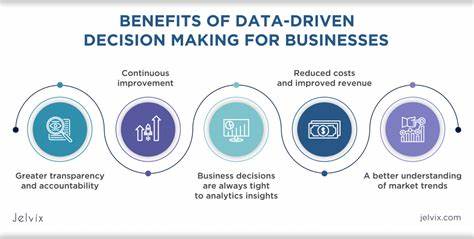The Importance of Data-Driven Decision Making in Business
In today’s fast-paced business environment, making decisions based on intuition alone is no longer sufficient. The rise of big data, analytics, and advanced technologies has revolutionized the way businesses operate, offering unprecedented opportunities to harness data for strategic decision-making. Data-driven decision-making (DDDM) is not just a trend; it’s a critical approach that can significantly enhance a company’s ability to compete and thrive in the market. Here’s why data-driven decision-making is so crucial in business today.
1. Informed Decisions Lead to Better Outcomes
At its core, data-driven decision-making is about leveraging data to make informed choices. Unlike decisions based solely on gut feeling or anecdotal evidence, data-driven decisions are grounded in objective information. This means that business leaders can analyze trends, measure performance, and predict outcomes with greater accuracy.
For example, a retail company can use data analytics to track customer behavior, identify purchasing patterns, and optimize inventory levels. By understanding what products are in demand and when, the company can make more accurate stock decisions, reducing waste and maximizing profits.
2. Enhanced Efficiency and Productivity
Data-driven decision-making helps businesses streamline their operations and improve efficiency. By analyzing data, companies can identify bottlenecks, uncover inefficiencies, and make adjustments to optimize processes.
Consider a manufacturing company that uses data to monitor production lines in real time. If the data reveals a slowdown in a particular area, management can quickly investigate and address the issue, minimizing downtime and improving overall productivity. This proactive approach is far more effective than reacting to problems after they have escalated.
3. Competitive Advantage
In a competitive market, data-driven decision-making can be a powerful differentiator. Companies that effectively use data to guide their strategies are often better positioned to anticipate market trends, respond to customer needs, and outmaneuver competitors.
For example, an e-commerce business that uses data analytics to personalize customer experiences can gain a competitive edge by offering targeted promotions and recommendations. This not only enhances customer satisfaction but also drives higher conversion rates and customer loyalty.
4. Risk Management and Mitigation
Every business faces risks, whether from market fluctuations, operational challenges, or external factors like economic downturns. Data-driven decision-making enables companies to identify and assess risks more accurately, allowing them to implement effective mitigation strategies.
For instance, financial institutions use data analytics to assess credit risk, detect fraudulent activity, and manage investments. By analyzing historical data and real-time information, these institutions can make informed decisions that minimize risk and protect their assets.
5. Innovation and Growth Opportunities
Data-driven decision-making is not just about optimizing existing processes; it’s also a key driver of innovation. By analyzing data, businesses can uncover new opportunities for growth, whether through product development, market expansion, or customer acquisition.
Take the example of a tech company that uses data to analyze user behavior on its platform. The insights gained from this analysis can reveal unmet customer needs or areas for improvement, leading to the development of new features or products that enhance the user experience and drive growth.
6. Accountability and Transparency
One of the often-overlooked benefits of data-driven decision-making is the accountability it brings to the organization. When decisions are based on data, they are easier to track and justify. This transparency ensures that all stakeholders are aligned with the company’s goals and strategies.
For example, in a sales organization, data-driven decision-making allows for clear tracking of performance metrics, such as sales targets and conversion rates. This transparency ensures that team members are held accountable for their performance, fostering a culture of continuous improvement.
7. Real-Time Decision Making
The digital age has ushered in an era of real-time data, enabling businesses to make decisions quickly and efficiently. In dynamic industries, where conditions can change rapidly, the ability to make real-time, data-driven decisions is crucial.
Consider a logistics company that uses real-time data to monitor delivery routes and traffic conditions. By analyzing this data, the company can make real-time adjustments to routes, minimizing delays and ensuring timely deliveries. This agility not only improves customer satisfaction but also reduces operational costs.
8. Data-Driven Culture: The Foundation for Success
To fully reap the benefits of data-driven decision-making, companies must cultivate a data-driven culture. This means ensuring that all employees, from top management to frontline workers, understand the importance of data and are equipped to use it effectively.
A data-driven culture encourages curiosity, critical thinking, and continuous learning. It empowers employees to make decisions based on data rather than assumptions, leading to better outcomes across the organization. Furthermore, it fosters collaboration, as teams can share data and insights to achieve common goals.
Conclusion
In an era where data is often referred to as the “new oil,” the importance of data-driven decision-making in business cannot be overstated. Companies that embrace this approach are better equipped to navigate the complexities of the modern business landscape, make informed decisions, and drive sustainable growth. By leveraging data to guide strategy, optimize operations, manage risk, and foster innovation, businesses can achieve a significant competitive advantage and ensure long-term success.
As technology continues to evolve, the role of data in decision-making will only become more critical. Organizations that invest in data analytics tools, build a data-driven culture, and prioritize data-driven decision-making will be the ones that thrive in the future.


